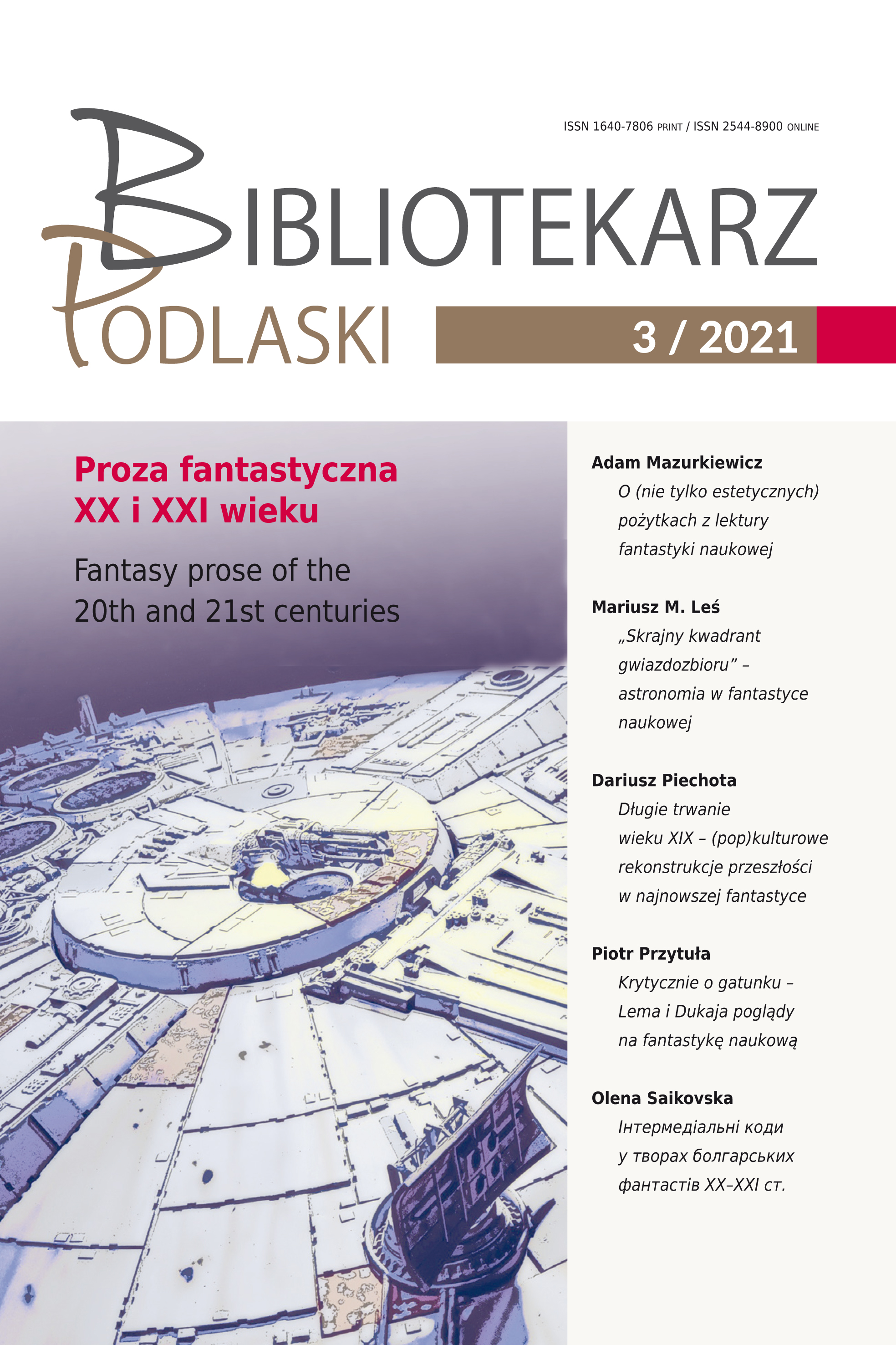Abstract
In the essay Science fiction: a hopeless case - with exceptions, Stanisław Lem spoke negatively about science fiction (but also about its authors and fans), proving its secondary nature and entanglement in market laws, pointing out the lack of reliable criticism from outside the fandom and flattering the tastes of recipients who only seek entertainment in literature. The author of Solaris included science fiction in the “lower kingdom” of literature, contrasting it with mainstream (“upper kingdom”). Thus, he symbolically strengthened the division into the fantastic “ghetto” and mainstream literature.
Jacek Dukaj also spoke about science fiction in a slightly less categorical tone. In the essay Krajobraz po zwycięstwie, czyli polska fantastyka AD 2006 [Landscape after victory, or Polish fantasy AD 2006], the author of Ice noticed similar problems that Lem had seen in the past (lack of external criticism, lack of ambition, stagnation and reluctance of SF writers to go beyond plot and language patterns, flattering fashions and treating science fiction prose only as entertainment literature); however, unlike Lem, he seemed to be interested in the fate of his environment and proposed specific solutions that could raise the rank of science fiction.
References
Czapliński P., Resztki nowoczesności. Dwa studia o literaturze i życiu, Kraków 2011.
Czapliński P., Poruszona mapa. Wyobraźnia geograficzno-kulturowa polskiej literatury przełomu XX i XXI wieku, Kraków 2016.
Dukaj J., 10 sposobów na zgnojenie książki, „Fantom” 2001, nr 9.
Dukaj J., Filozofia fantasy, „Nowa Fantastyka” 1997, nr 8.
Dukaj J., Krajobraz po zwycięstwie, czyli polska fantastyka AD 2006, „Nowa Fantastyka” 2007, nr 1.
Dukaj J., Lament miłośnika cegieł, „Gazeta Wyborcza” 2005, nr 263.
Dukaj J., SF po Lemie, „Dekada Literacka” 2002, nr 1–2.
Dukaj J., Po piśmie, Kraków 2019.
Jarzębski J., Fantastyka i pesymizm, [w:] Ćwiczenia z rozpaczy. Pesymizm w prozie polskiej po 1985 roku, red. J. Jarzębski i J. Momro, Kraków 2011.
Kaczor K., Z „getta” do mainstreamu. Pole literackie fantasy, Kraków 2017.
Lem S., Mój pogląd na literaturę. Rozprawy i szkice. Dzieła. Tom XXI, Warszawa 2009.
Lem S., Fantastyka i futurologia, t. 1. Dzieła. Tom XXIII, Warszawa 2009.
Majewski P., Błędni rycerze umysłu. O pisarstwie Jacka Dukaja, [w:] Ćwiczenia z rozpaczy. Pesymizm w prozie polskiej po 1985 roku, red. J. Jarzębski i J. Momro, Kraków 2011.
Moc generowania sensów. Rozmowę z Jackiem Dukajem przeprowadzili redaktorzy „Esensji”, „Esensja” 20.12.2010, http://esensja.pl/ksiazka/wywiady/tekst.html?id= 10943&strona=1#strony [dostęp: 20.06.2021].
Oramus D., O pomieszaniu gatunków. Science fiction a postmodernizm, Warszawa 2010.
Orliński W., Co to są sepulki? Wszystko o Lemie, Kraków 2007.
Ostaszewski R., Etapy, Olsztyn 2008.
Parowski M., Małpy Pana Boga. Słowa. Szkice i rozmowy o wyobraźni i rzeczywistości. Polemiki, Warszawa 2011.
Uniłowski K., Lord Dukaj albo fantasta wobec mainstreamu, [w:] 20 lat literatury polskiej 1989–2009. Cz. 2: Życie literackie po roku 1989, red. D. Nowacki, K. Uniłowski, Katowice 2014.
Warczok T., Dominacja i przekład. Struktura tłumaczeń jako struktura władzy w światowym i polskim systemie literackim, [w:] Literatura polska po 1989 roku w świetle teorii Pierre’a Bourdieu. Podręcznik, red. G. Jankowicz, P. Marecki, M. Sowiński, Kraków 2015.
Articles published in the “gold open access” mode on the basis of a non-exclusive license agreement between the publisher and the author. Permitted use:
- the publication may be read and stored on any device,
- the publication may be cited (with obligatory reference to the author, the title of the text, as well as the full title, bibliographic address of the issue and page of the journal)
The editorial team of “Bibliotekarz Podlaski” implements an open access policy by publishing materials in the form of the so-called Gold Open Access. From volume 42 (issue 1/2019), the journal is available under the Creative Commons license (Attribution – ShareAlike: CC BY-SA).
The key declarations of the Open Access and Open Science movement, which we fully support, are available on the CEON Open Science website.
COPYRIGHT:
The editorial team of “Bibliotekarz Podlaski” implements an open access policy by publishing materials in the form of the so-called Gold Open Access. The journal is available under the Creative Commons license – Attribution – ShareAlike 4.0: International: CC BY-SA 4.0).
The key declarations of the Open Access and Open Science movement, which we fully support, are available on the CEON Open Science website.
“Bibliotekarz Podlaski” allows its readers to read, download, copy, distribute, print, search and link to the full content of articles. We enable full, immediate, unlimited (both in a territorial, temporal and technical sense) open access to all published content, in accordance with the principle that freely available research increases and accelerates the global development of science and the exchange of knowledge.
The editorial team of “Bibliotekarz Podlaski” encourages authors to place articles published in the journal in open repositories (after the review or the final version of the publisher), provided that a link to the journal’s website is provided.
The journal does not charge the authors any fees for accepting and publishing their texts.


